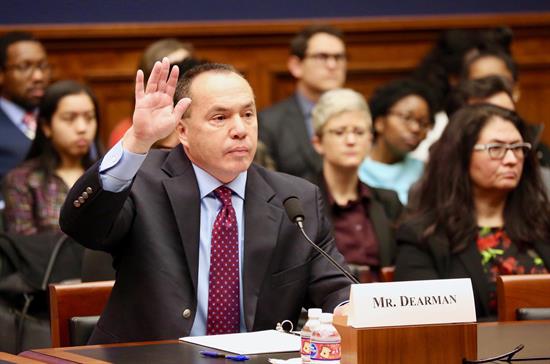Today, the Subcommittee on Early Childhood, Elementary, and Secondary Education, chaired by Rep. Todd Rokita (R-IN), held a hearing on “Examining the Government’s Management of Native American Schools.”
“Under the Department of Interior, the Bureau of Indian Education (BIE) is tasked with providing Native American children with a high-quality education that upholds their tribes’ traditions and culture,” said Chairman Rokita. “Over 47,000 students in 183 elementary and secondary schools depend on this government agency to provide them with educational opportunities in a safe and healthful learning environment. Unfortunately, so many Native American children are not receiving the education they deserve.”
Members of the subcommittee heard from BIE’s Director Tony Dearman about the challenges facing BIE, and what the bureau is doing to provide educational opportunities to Native American students while strengthening its accountability measures.
“We recognize that we face unique and urgent challenges in providing a high-quality education to BIE students. With such challenges come tremendous opportunities for improvement in the way we operate on a day-to-day basis. As we work to improve local service delivery, the BIE is focusing its attention on allocating critical resources effectively and efficiently to achieve the agency’s core mission while, at the same time, increasing accountability throughout the agency,” Dearman said.
During his testimony, Director Dearman discussed the Government Accountability Office’s (GAO) decision to list the BIE on its High-Risk Report in 2017. The GAO noted several weaknesses in the program, including a lack of oversight of school safety and its use of Interior funds, degradation of school facilities, and data collection inefficiencies.
Dearman said, “As Director, I am committed to addressing these outstanding items. I am working with our senior leadership team within BIE as well as IA [Indian Affairs], the Secretary’s office, and our colleagues at the GAO to ensure that the BIE systematically and comprehensively addresses each outstanding recommendation.”
Dearman told subcommittee members that in 2016, the Department of Interior directed the BIE to restructure its organization to better serve students. He described the steps that the BIE is taking to shift its role in Native American education.
“BIE proposes to realign the organization from a regional basis to a structure based on the types of schools served; namely (1) tribally-controlled schools, (2) BIE-operated schools, and (3) schools serving the Navajo Nation due to its geographical size. In January 2018, the Department held meetings in Washington, D.C. with senior agency officials to discuss a Department-wide reorganization. BIE was included in this meeting to ensure a focus remains on the varying needs of Indian students,” Dearman told subcommittee members.
Dearman described the BIE’s strategic plan to improve its management based on a previous GAO assessment of BIE’s internal weaknesses. To date, the BIE has held five tribal consultations and hosted several listening sessions to gain feedback from tribes and Indian education stakeholders of how to streamline its management.
“To ensure that the strategic plan is effective, the BIE has consulted with external subject matter expert organizations, including WestED, the South Central Comprehensive Center, the Building State Capacity and Productivity Center, and the Council of Chief State School Officers. These organizations have provided BIE with technical expertise throughout the process and shared best practices in developing an effective, long-term strategic plan that guides the work of the organization for the next five years.” Dearman said.
He went on to say, “The BIE will increase our focus on professional development to ensure that school personnel have the training and support necessary to address the various needs of our students.”
Native American students deserve an education that provides them with the best chance at success. The committee will continue to monitor the BIE’s efforts to strengthen its accountability measures and better serve its students.
# # #

